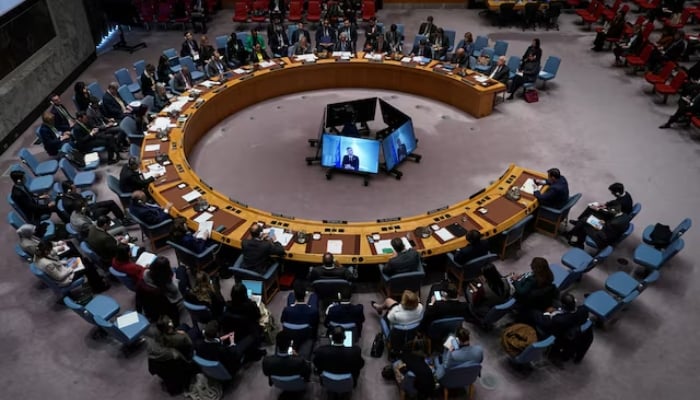UN faces storm of doubts

With its influence discredited and its budget in tatters, the UN faces storm of doubts and is weathering a firestorm of criticism as it celebrates its 80th anniversary — and tries to convince a polarized and conflict-wracked world it is more vital than ever. The UN faces storm of doubts about its effectiveness and future, prompting urgent discussions among member states.
The UN’s 193 member states will mark Thursday the signing of the organization’s foundational treaty, the UN Charter, on June 26, 1945, in San Francisco. After ratification, the United Nations came into being on October 24.
The anniversary comes as the world body faces a multi-faceted crisis that has raised questions about its future.
“Since the end of the Cold War, we have seen the organization struggle in cases from the Rwandan genocide to the Iraq war,” Richard Gowan, an analyst at the International Crisis Group, told AFP.
“When each big crisis comes, commentators announce that the UN is finished. And yet it still survives,” he added.
“That said, this is an especially bad moment,” Gowan acknowledged, pointing to numerous countries that are “deeply frustrated” by the UN Security Council’s failure to act on major conflicts like those in Ukraine and Gaza.
That inaction is largely due to the veto power of the council’s five permanent members — Britain, China, France, Russia and the United States — which have competing interests.
As a result, the UN faces storm of doubts from critics who question the role of the Security Council in maintaining peace and security worldwide.
“The UN system as a whole has a credibility crisis, and it is not clear that the organization’s members have the resources or political energy to rescue it,” Gowan told AFP.
For Romuald Sciora, a research fellow at the French Institute for International and Strategic Affairs, the credibility issue can only result in the virtual disappearance of an organization that is already a political “dwarf” on the world stage.
The credibility crisis means the UN faces storm of doubts about its authority and relevance in a rapidly changing global landscape.
“I’m not sure the UN will cease to exist, even by its 100th anniversary,” Sciora told AFP. “I see a slow vanishing, and the UN becoming a bit of a ghost,” like “these old organizations whose names we have forgotten.”
But experts say while the UN desperately needs to enact tough reforms, not all of its problems come from within, and it has become an easy scapegoat for its divided membership.
‘Worse’ without UN faces storm of doubts
In this context, it is clear that the UN faces storm of doubts about its capacity to deliver on its promises to the world.
Gissou Nia of the Washington-based Atlantic Council think tank says she fears that “the approach of might is right… is what is taking hold, and it brings us further and further away from the ideals” that led to the UN’s founding as World War II ended.
Nia, a human rights lawyer, says she hopes enough people will remain committed to the set of ideals and values “that will keep the UN alive,” but still worries about the constant questioning of those values, notably from US ally Israel.
Despite these challenges, advocates argue that the UN faces storm of doubts from those who underestimate its potential for positive change.
“The constant berating from some very loud voices about the UN either being anti-Semitic, or the UN being a waste of funding, or the UN propping up dictators, actually has an impact,” Nia told AFP.
In a world devastated by the largest number of ongoing conflicts since 1945, and ravaged by major humanitarian crises, “the United Nations has never been more needed,” Secretary-General Antonio Guterres said recently.
However, in light of ongoing conflicts, the UN faces storm of doubts that challenge its historical mission of peacekeeping and humanitarian assistance.
“Our values have never been more relevant. And the needs have never been greater.”
As the anniversary approaches, the UN faces storm of doubts regarding its capability to resolve global issues effectively, which is a cause for concern among many nations.
Funding has nevertheless grown scarce as donors — especially the United States under President Donald Trump — pull back.
Given the financial constraints, Guterres launched the UN80 initiative in a bid to streamline operations. Those changes could include thousands of positions being cut.
For Gowan, “the UN is a very big organization, and of course it suffers from a variety of bureaucratic problems, just as almost all big organizations do. (…) So of course it deserves scrutiny and criticism.”
Ultimately, the future of the UN is uncertain as it faces storm of doubts that continue to shape the dialogue around global governance.
But, he added: “I think we have gotten a bit too accustomed to having this system at our service, and tend to spend too much time grumbling about its flaws and not enough time acknowledging its successes.”
The United Nations remains a place where arch-rivals and enemies still sit at the same table to air grievances, and where the smallest member state can have its voice heard.
While the UN has made significant strides, it still faces storm of doubts that threaten to undermine its foundational principles.
The UN also does important work on the ground, from the World Food Program bringing needed supplies to more than 100 million people in 120 countries last year, to the thousands of peacekeepers protecting civilians in conflict zones.
“The UN was a magnificent tool,” Sciora said. “Obviously, it would be worse if it were to disappear from one day to the next.”
In conclusion, if the UN is to thrive, it must address the challenges it faces, as the UN faces storm of doubts from various fronts.